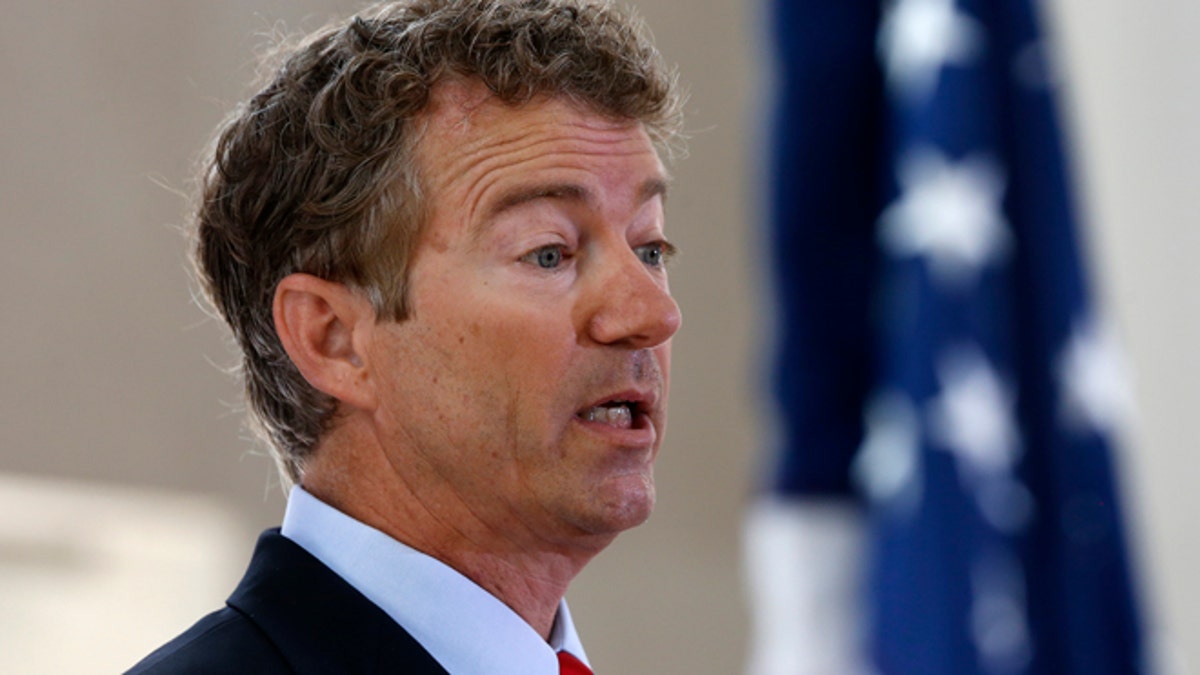Sen. Rand Paul: 'No clearly defined mission in Syria'
Senator Paul responds to Obama's speech on Syria
Senators Rand Paul and Elizabeth Warren called President Donald Trump’s decision to take military action against the Syrian government a violation of the U.S. Constitution.
Paul, R-Ky., and Warren, D-Mass., acknowledged the heinous nature of the chemical attacks that killed more than 80 civilians – many of them children -- in Syria believed to have been authorized by President Bashar al-Assad.
But the senators slammed Trump’s decision to use military force without the approval of Congress or the United Nations.

AP (Sen. Rand Paul, R-Kentucky)
"While we all condemn the atrocities in Syria, the United States was not attacked," Paul said in a statement after news broke that the U.S. launched more than 50 Tomahawk cruise missiles on an airfield in Syria.
"The president needs congressional authorization for military action as required by the Constitution, and I call on him to come to Congress for a proper debate," Paul said. "Our prior interventions in this region have done nothing to make us safer, and Syria will be no different."
Warren denounced the release of a deadly chemical bomb in Syria that killed of dozens of civilians. But she said it did not justify Trump’s decision to strike Syria without going through proper protocol.
"The Constitution gives the power to authorize the use of military force to the legislative branch,” Warren said. “Expanded military intervention in Syria requires action by Congress. If President Trump expects such an authorization, he owes the American people an explanation of his strategy to bring an end to the violence in Syria. We should not escalate this conflict without clear goals and a plan to achieve them."
Announcing the assault from his Florida resort, Trump said there was no doubt Assad was responsible for the chemical attack.

AP (Sen. Elizabeth Warren, D-Massachusetts)
A White House official said more than two dozen members of Congress, both Democrats and Republicans, were briefed Thursday by White House and Cabinet officials. House Speaker Paul Ryan, the No. 3 U.S. official, said he was among those informed.
The War Powers Resolution, enacted in 1973, long after American troops began fighting in Vietnam, required the president to consult with Congress before sending U.S. armed forces into combat unless there already had been a declaration of war.
The troops could not stay more than 90 days unless lawmakers backed the decision. The law also sought to give the president "leeway to respond to attacks or other emergencies," according to the Council on Foreign Relations.
And it is that leeway that presidents George W. Bush, Barack Obama and now Trump have used to their advantage. Following the Sept. 11 attacks in 2001, Congress gave Bush authority to attack any countries or groups involved in the attacks, which was generally accepted to mean al-Qaida.
Obama used that same authority to fight the Islamic State militant group, which emerged in 2014 as an outgrowth of al-Qaida. Trump has used that same authority to continue military action in Iraq, Afghanistan and Syria.
The Obama administration maintained in 2011 that U.S. involvement in the months-long air campaign against Libya didn't require congressional permission because American forces were largely playing a supporting role as part of an international coalition.
The Associated Press contributed to this report.






















